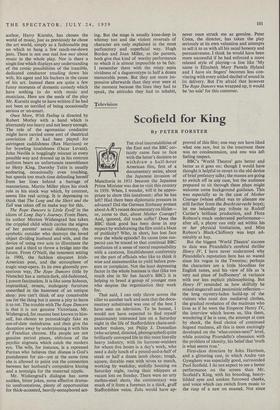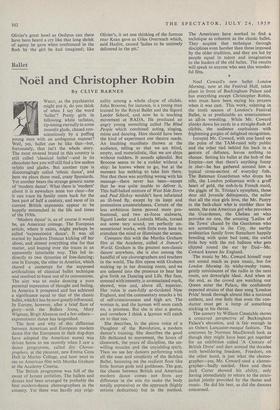Television
Scofield for King
By PETER FORSTER
THE rival inscrutabilities of the East and the BBC cer- tainly came face to face with the latter's decision to withdraw a half-hour American film, first of a documentary series, about the Japanese invasion of Manchuria in 1931 because the Japanese Prime Minister was due to visit this country in 1959. When, I wonder, will it be appro- priate to show this instalment: after he has left? Had there been diplomatic pressure in advance? Did the German Embassy protest about A-R's recent documentary on Hitler— or, come to that, about Mother Courage? And, ignored, did trade suffer? Does the BBC think good has been done in any respect by withdrawing the film amid a blaze of publicity? Who, in short, has lost face over the whole episode? Its cause (one sus- pects) can be traced to that continual BBC confusion of a sense of moral responsibility with a cautious, Establishment conformity on the part of officials who like to think it wise and statesmanlike to yield before pres- sure or complaint. Not the least depressing factor in the whole business is that (like too much else in Sir Ian Jacob's BBC) it is helping to breed a group of younger men who despise the organisation they work for.
That said, I can only throw across the tiller to another tack and note that the docu- mentary substituted was one of the best I have seen on television. To be honest, I would not have expected to find myself passionately interested late on a Saturday night in the life of Staffordshire chain-and- anchor makers, yet Philip J. Donnellan (who scripted, directed, photographed) quite brilliantly conveyed life in this most literally heavy industry, with its hammer-wielders for whom five hours is a day's work, who need a daily lunch of a pound-and-a-half of steak or half a dozen lamb chops; tough, square, durable men with wives to match, working by weekday, stolidly boozing on Saturday night, racing their whippets at vacant lots on Sunday. There were no arty molten-steel shots, the commentary was much of it from a foreman in a thick, gruff Staffordshire voice. Zola would have ap-
proved of this film; one may not have liked what one saw, but in the treatment there was no condescension, and one was left feeling respect.
BBC's 'World Theatre' gets better and better as it goes on: though I would have thought it helpful to revert to the old device of brief prefatory talks; the masses are going to switch off in any case, but the audience prepared to sit through these plays might welcome some background guidance. This was especially so in the case of Mother Courage (whose effect was to alienate me still further from the Brecht-ist-recht boys); let me belatedly pay tribute to Rudolf Cartier's brilliant production, and Flora Robson's much underrated performance— after all, a player can only act within his or her physical limitations, and Miss Robson's Black-Chiffonry was kept ad- mirably at bay.
But the biggest 'World Theatre' success to date was Pirandello's cerebral thriller Henry IV. I have never understood why Pirandello's reputation here has so waned since his vogue in the Twenties; perhaps the characters are a little bloodless for English tastes, and his view of life as 'a very sad piece of buffoonery' at variance with our less explicit philosophising. But Henry IV reminded us how skilfully he mixed stagecraft and pessimistic reflection— the long mystery-laden build-up of the visitors who must don medieval clothes, the gradual revelation of the madman who lives as if he were the Emperor Henry IV, the interview which leaves us, like them, wondering if he is sane, the attempt at cure by shock, the final choice of continued feigned madness, all this is most excitingly developed on the 'what-comes-next?' level, while pointing Pirandello's obsession with the problem of identity, his belief that 'truth is what seems true.'
First-class direction by John Harrison, and a glittering cast, in which Andre van Gyseghem was especially good, surrounded Paul Scofield. I do not expect to see a better performance on the screen than Mr. Scofield's King, with his brooding, heavy- lidded eyes and sunken furrowed cheeks, and voice which can switch from music to the rasp of a saw on enamel. Not since Olivier's great howl as Oedipus can there have been heard a cry like that long shriek of agony he gave when confronted in the flesh by the girl he had imagined; like Olivier's, it set one thinking of the famous roar Kean gave as Giles Overreach which, said Hazlitt, caused 'ladies to be untimely delivered in the pit.'







































 Previous page
Previous page